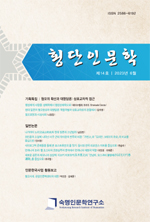현대 일본의 혐오현상과 대항담론
The Phenomenon of Hatred and Counter-discourse in Contemporary Japan: From the Perspective of Multiple Discrimination and Intersectionality
- 숙명여자대학교 인문학연구소
- 횡단인문학
- 제14호
-
2023.0617 - 66 (50 pages)
-
DOI : 10.37123/th.2023.14.17
- 73

본 논문은 현대 일본 사회에서 나타나고 있는 혐오현상의 현황을 ‘복합차별’과 ‘상호교차성’의 관점에서 개관하고, 혐오의 확산에 저항하기 위한 대항담론의 가능성을 고찰하는 것을 목적으로 한다. 2010년대 이후 일본에서는 인종·민족적 소주자, 여성과 성소수자, 사회적 약자를 향한 혐오가 복합적으로 분출되고 있다. 일본의 혐오 관련 연구와 담론은 이와 같은 혐오현상에 대응하여 전개되고 있는데, 혐오현상의 복합적 양상에 대응하기 위해 반(反) 혐오 담론 역시 횡단적 접근이 요구되고 있다. 일본에서 차별과 관련된 논의와 대항 운동은 ‘복합차별’ 개념에 기반해 축적되어온 흐름이 있으며, 현재 ‘상호교차성’을 둘러싼 논의와도 접속되는 양상을 보인다. 하지만 일본에서의 ‘상호교차성’ 논의는 일본 내 마이너리티의 경험과 목소리를 충분히 반영하지 못하고 있다는 점에서 그 가능성은 양가적이라 할 수 있다.
This paper aims to examine the phenomenon of hatred in contemporary Japan from the perspectives of ‘multiple discrimination’ and ‘intersectionality’ and to consider the possibility of counter-discourses to resist the spread of hate. Since the 2010s, Japan has witnessed an eruption of compounded hatred against racial and ethnic minorities, women and sexual minorities, and socially vulnerable people. Hate-related research and discourse in Japan have developed in response to this phenomenon, and anti-hate discourse requires a transversal approach to respond to the complexity of the phenomenon. Anti-hate discourses and movements in Japan have been accumulating based on the concept of ‘multiple discrimination’ and are currently connected to discussions on ‘intersectionality’. However, the potential of the intersectionality debate in Japan is ambivalent, as it does not fully reflect the experiences and voices of minorities in Japan.
1. 들어가며
2. 2010년대 이후 일본의 혐오현상과 대항운동 개관
3. 대항담론 및 대항운동의 구축: 복합차별과 상호교차성 논의를 중심으로
4. 복합차별에 저항해 온 마이너리티 여성 운동의 목소리: 여성 공투의 균열과 마이너리티 연대
5. 나오며
참고문헌
(0)
(0)